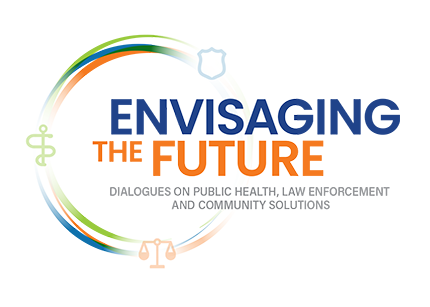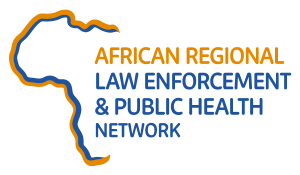
Collaboration between law enforcement and public health institutions is crucial for the effective implementation of health policies and the protection of vulnerable populations. The first meeting of the African Law Enforcement and Public Health Network (ALEPHN) was held in Pretoria, South Africa, in December 2024 at the closing of ALEPH 2024 conference. The ALEPH 2024 conference brought together stakeholders from 25 countries of which 17 countries were from Africa that included Nigeria. During the ALEPHN launch meeting, African countries committed to returning to their respective countries to domesticate the Law Enforcement and Public Health Network, ensuring its integration into national frameworks. Nigeria was the first country to organise ALEPHN launch workshop held on the 3rd – 4th of March 2025 at the National Agency for the Control of AIDS (NACA) Conference Hall, Abuja. The launch workshop in Nigeria was convened to build on that commitment by enhancing law enforcement agencies’ understanding of public health laws, particularly concerning key populations and human rights concerns. Given the challenges of criminalization, stigma, and limited law enforcement awareness of public health issues, this engagement sought to strengthen partnerships and foster a more inclusive approach to public health interventions.
The Objectives of the launch workshop was to foster collaboration between law enforcement agencies, public health institutions, and community leaders. Further, to improve law enforcement’s understanding of public health laws and their practical application and to outline action steps for continued engagement and policy development in the law enforcement-public health (LEPH) space. The meeting was also key to address barriers such as stigma, criminalization, and knowledge gaps that hinder access to public health services, particularly among vulnerable populations. The meeting employed a combination of presentations, group work, discussions, a SWOT analysis, and structured debates to explore the intersection between law enforcement and public health. Participants engaged in interactive exercises analyzing power dynamics between law enforcement and those who receive their services, ranking social influences, and identifying law enforcement challenges. Additionally, technical working groups were formed to develop recommendations for future engagement
Munya Katumba who provides technical assistant and coordination of the Africa Law Enforcement and Public Health Network (ALEPHN) provided an overview of ALEPHN and highlighted how criminalization and stigma affect key populations’ access to both law enforcement services and healthcare. He emphasized the need for law enforcement to recognize their community role and align them to their institutional responsibilities. Subsequently, participants did a SWOT analysis of Nigeria’s law enforcement-public health (LEPH) landscape. The groups examined strengths, weaknesses, opportunities, and threats in collaboration and parnerships among LEPH sectors. Group discussions and presentations emphasized key solutions, including capacity building and strengthening, improved collaboration between law enforcement and public health bodies, and public outreach programs to educate communities about their health rights. Additionally, the importance of continuous engagement through quarterly meetings and an expanded WhatsApp group for ALEPHN members was emphasised.
The Nigeria stakeholders listed the following as the main challenges & recommendations:
- Limited Knowledge: Many law enforcement officers lack a clear understanding of public health laws, which necessitates the need for structured training programmes.
- Resource Constraints: Insufficient funding and materials hinder effective law enforcement engagement in public health matters. Adequate financial support should be secured to facilitate training and resource development.
- Fragmented Strategies: There is an absence of a unified approach to enforcing public health laws. Collaboration between public health institutions, law enforcement, CSOs, and NGOs must be strengthened to create a coherent strategy.
- Lack of Coordination: Inconsistent law enforcement deployment for public health assignments results in inefficiencies. Regular consultative meetings should be held to ensure better alignment.
- Stigma and Criminalization: Key populations, including individuals exiting correctional facilities, continue to face stigma. Expanding public health outreach beyond substance abuse to cover all vulnerable groups was recommended.
- Policy Gaps: There is a need to establish clear policies and technical working groups to harmonize law enforcement’s role in public health programmes.
Conclusion:
The meeting emphasised the need for continuous collaboration between law enforcement and public health institutions to improve health outcomes and uphold human rights. By fostering open dialogue, integrating legal programmes into public health initiatives, and prioritizing social inclusion, stakeholders can develop sustainable solutions to law enforcement and public health challenges. The commitment to ongoing engagement reflected a collective dedication to addressing these issues effectively.
The next steps for Nigeria are:
- Training Programmes: Develop and implement capacity-building sessions for law enforcement on public health laws.
- Technical Working Groups: Establish specialized teams to create enforcement guidelines and Standard Operating Procedures (SOPs).
- Quarterly Engagements: Maintain structured follow-ups through regular meetings.
- Public Outreach: Design community awareness campaigns to improve public understanding of health laws.
- Expansion of ALEPHN’s Communication Platform: Grow the WhatsApp group and other digital engagement platforms for continued discussions.
- Policy Advocacy: Work towards the establishment of a Terms of Reference (ToR) for law enforcement-public health cooperation.
- Enhanced Stakeholder Engagement: Strengthen advocacy efforts with high-level policymakers, including the Commissioner of Health and law enforcement leadership.
The next ALEPHN country launch workshops will be Burkina Faso (15 April 2025), Burundi (6 May 2025), Uganda (8 May 2025), Kenya (14 May 2025), Mozambique (TBA), South Africa and Zimbabwe (TBA).
Appendices: Photographs from the Nigeria Network launch.








